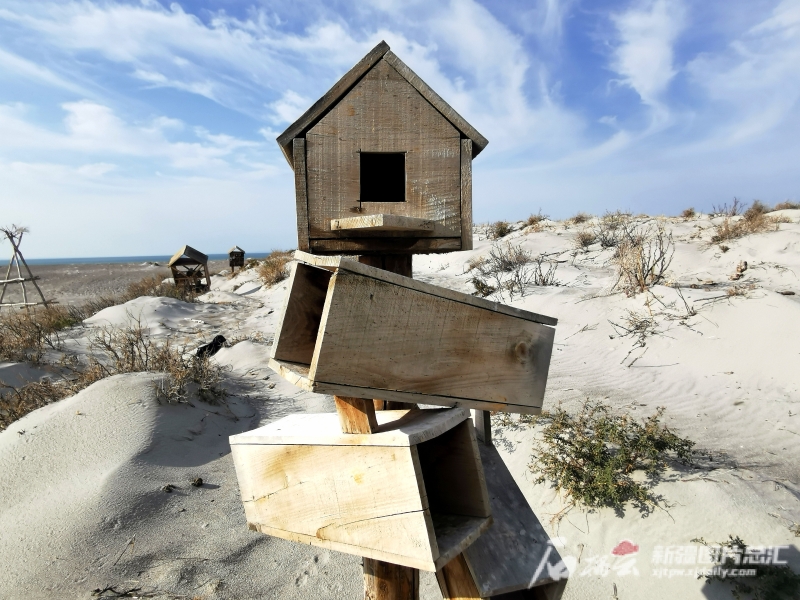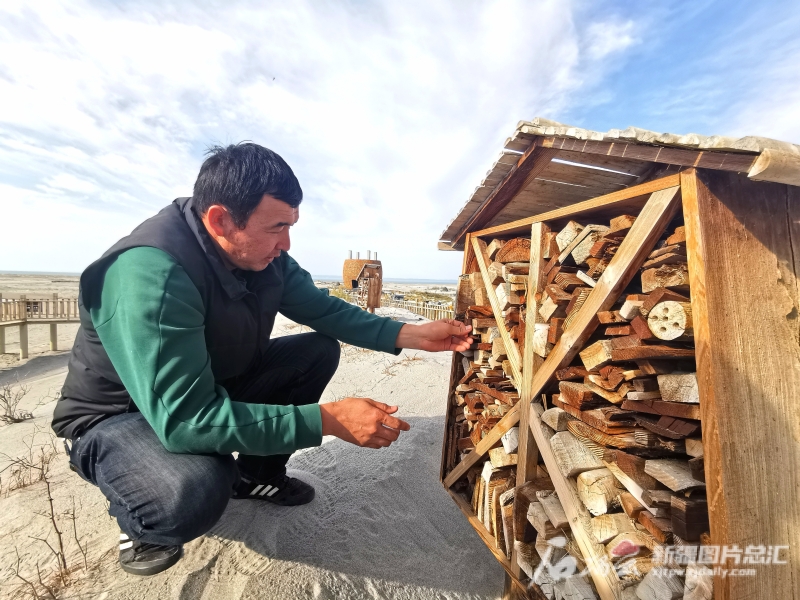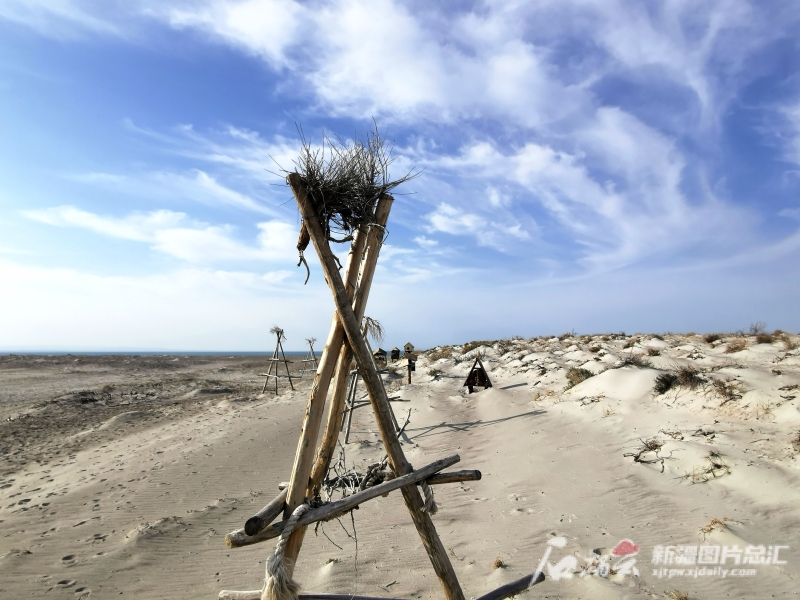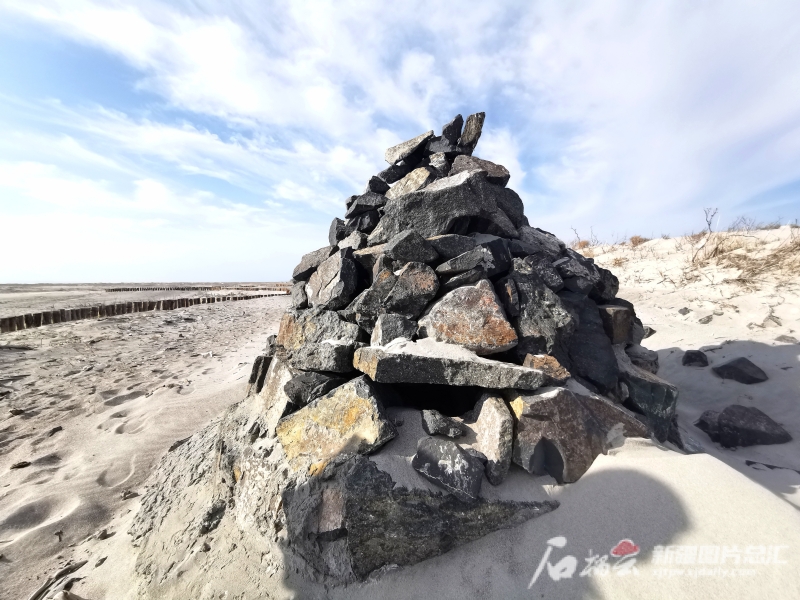Shiliuyun-Xinjiang Daily (Reporter: Cao Hua) news: Autumn is the season when migratory birds migrate. Patrollers have already been inspecting the bird-attracting devices to prepare for the arrival of large numbers of birds in the Ulungur Lake National Wetland Park in Fuhai County, Altay Prefecture, northwest China’s Xinjiang Uygur Autonomous Region.

Photo shows a wooden bird shelter in the Ulungur Lake National Wetland Park in Fuhai County, Altay Prefecture, northwest China’s Xinjiang Uygur Autonomous Region. (Photo by Shiliuyun-Xinjiang Daily/ Cao Hua)
“Look, a lot of ‘guests’ have been checked in this ‘insect hotel’. It can offer enough food for migratory birds,” said Wushken Murat,a patroller in the national wetland park, pointing a bird-attracting device on the afternoon of October 13, 2023.

Photo shows Wushken Murat, a patroller checks an “insect hotel” in the Ulungur Lake National Wetland Park in Fuhai County, Altay Prefecture, northwest China’s Xinjiang Uygur Autonomous Region. (Photo by Shiliuyun-Xinjiang Daly/ Cao Hua)
The device, called “insect hotel”, is about one meter high and consists of various thin wooden strips. There are many man-made holes on the strips that insects inhabit. The “insect hotels” look like boxes distributed on the sands of Unlungr Lake from afar.
“‘Insect hotel' is actually a reproduction site for insects, so it offers abundant food resources fo birds, and as a result, it attract more birds to come.”Wushken Murat said that there are over 500 bird-attracting devices set around the wetland park, including “insect hotel”, bird’s nest, shelters for birds, eagle-attracting shelf and bird tower piled up by stones. With bird-attracting devices, birds can inhabit the Ulungur Lake wetland better.

Photo shows a bird’s nest in the Ulungur Lake National Wetland Park in Fuhai County, Altay Prefecture, northwest China’s Xinjiang Uygur Autonomous Region. (Photo by Shiliuyun-Xinjiang Daily/ Cao Hua)
Ulungur Lake National Wetland Park in Fuhai County covers an area of more than 120,000 hectares. It is one of the few natural wetlands in the arid plain area of northwest China. Located on the migration routes of global migratory birds from Central Asia to East Africa and West Asia. It is an important node of the global biological chain, and also an “energy supplement station” for migratory birds to fly over the Tianshan Mountains and the Altai Mountains.
"Every October, a large number of migratory birds will fly to Ulungur Lake National Wetland Park and stay here for about 50 days. The fish resources and aquatic plants in the lake are the main food source of migratory birds. After resting, migratory birds will fly to the warm south to overcome winter,” said Ren Yuehu, deputy director of the administration of the Uulungur Lake National Wetland Park in Fuhai County.
In order to provide a good habitat for birds, Fuhai County has strengthened the protection and restoration of wetlands in recent years, and the ecological environment has been continuously improved. The good ecological environment has attracted rare birds such as white-headed ducks, whooper swans, mute swans, and great cormorants to breed in and inhabit the wetland.
According to statistics, the number of bird species in the Ulungur Lake National Wetland Park in Fuhai County has increased from more than 60 in 2017 to more than 270 now, and the biodiversity has increased significantly.

Photo shows a bird tower built of stones in the Ulungur Lake National Wetland Park in Fuhai County, Altay Prefecture, northwest China’s Xinjiang Uygur Autonomous Region. (Photo by Shiliuyun-Xinjiang Daily/ Cao Hua)
The Administration of the Ulungur Lake National Wetland Park has set up seven management stations around the wetland to strengthen the inspection and protection of bird habitat and reproducing places to ensure birds' undisturbed life. At the same time, activities such as Bird Week and World Wetland Day are actively used to publicize laws and regulations on wildlife and wetland protection to raise people's awareness of ecological environment protection.
In early autumn, when you walk on the shores of the Ulungur Lake, you can see birds living freely here—some foraging in the shallow waters and some flying in the blue sky, forming a vibrant scene.
(A written permission shall be obtained for reprinting, excerpting, copying and mirroring of the contents published on this website. Unauthorized aforementioned act shall be deemed an infringement, of which the actor shall be held accountable under the law.)









